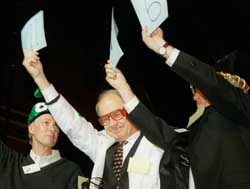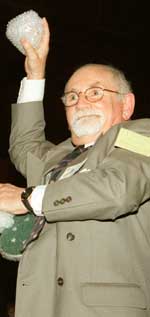Ig Nobels flush out the world’s top brains :Bad science gets good reputation at 10th annual prize ceremony
While more informed minds awaited this week’s Nobel Prize awards, the Sanders Theatre crowd cheered the Tenth 1st Annual Ig Nobel Prize Ceremony, honoring “achievements that cannot, or should not, be reproduced.”
The two-hour ceremony was conducted in comedic overdrive, with an over-the-top wink and nudge to the audience, from the traditional “Welcome, Welcome” speech — consisting of just two words: “welcome” and “welcome” — to the equally traditional and equally brief “Goodbye, Goodbye” speech.

The enthusiastic audience was anything but passive. Encouraged by the distribution of sheets of bubble wrap — the official substance of the Tenth 1st Annual Ig Nobels — the crowd accompanied the show with a bubble-popping symphony. The audience also helped decorate the stage with a rain of paper airplanes — tossed back at them by the assembled dignitaries.
Some audience members said the “audience participation” was their favorite part of the show — after all, where else do you get to throw paper airplanes at Nobel laureates — while others said the onstage antics were the biggest draw.
“You get to see smart people do dumb things,” said Coby Hough of Washington, D.C., who attended with his sister, Meaghan, from Medford, Mass.
The Ig Nobels are produced by the science humor magazine Annals of Improbable Research and co-sponsored by the Harvard Computer Society, the Harvard-Radcliffe Science Fiction Association, the Harvard-Radcliffe Society of Physics Students, the book “Best of Annals of Improbable Research,” and Duck brand bubble wrap.


Though the laureates were front and center throughout the show, the Ig Nobels also featured other real-life dignitaries, including Australian Consul General Michael Baume, former principal pianist of the New York Philharmonic Orchestra Leonid Hambro, and the former president of Ecuador, Jamil Mahuad.
The show kicked off with a parade featuring the likes of Evil Geniuses for a Better Tomorrow, Lawyers For and Against Intelligence, the Harvard Computer Society (marching in binary), and the Museum of Bad Art.
Other features included a debating contest to determine the world’s most intelligent person — rounds were 30 seconds, with both contestants talking simultaneously. There was also an opera crafted around a couple’s argument over whether eating fish or brains will make you more intelligent. The opera’s original numbers included memorable lines such as “Medulla oblongata is bound to make me smata” and “Trout, cod, or barracuda, salmon will make me shrewda.”
Both apparently lost that argument.
The show’s amazing centerpiece, however, was the real research it honored. Equally amazing was the fact that some winners chose to attend the ceremony to receive their prizes in person. Awards this year included not only the usual brain-adorned commemorative plaque, but also an Ig Nobel medallion crafted from genuine concrete.
Last Thursday’s awards were followed by the Ig Medical Lectures at the Harvard School of Public Health on Oct. 6 and the Ig Informal Lectures at the Massachusetts Institute of Technology on Oct. 7.
Audience members may not have been seeking words of wisdom from the prize winners, but they got them anyway. The Computer Science Prize winner, Chris Niswander of Tucson, Ariz., thanked his sister’s cat for the inspiration that led to the winning development of software that detects a cat walking on a keyboard.
Australian Consul General Michael Baume accepted the Literature Prize on behalf of winner Jasmuheen of Brisbane, Australia, whose book explained that people didn’t need food and could subsist on air. Baume praised Jasmuheen’s dedication to the ozone layer, since a diet of air would reduce ozone-killing flatulence.
Perhaps the most inspirational comment came from Medicine Prize winner Pek van Andel, who pursued his dream to take magnetic resonance imaging pictures of the love act despite resistance from many quarters.
“The lesson of this is you should cherish your idiot idea and push it through, even through your boss or bosses if need be,” he said. “Thanks for this Ig Nobel Prize for ‘Love Among the Magnets.’”




